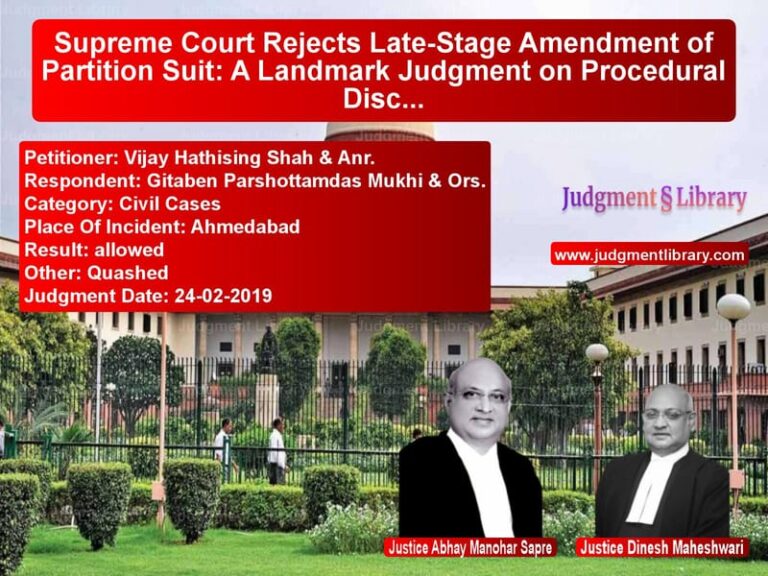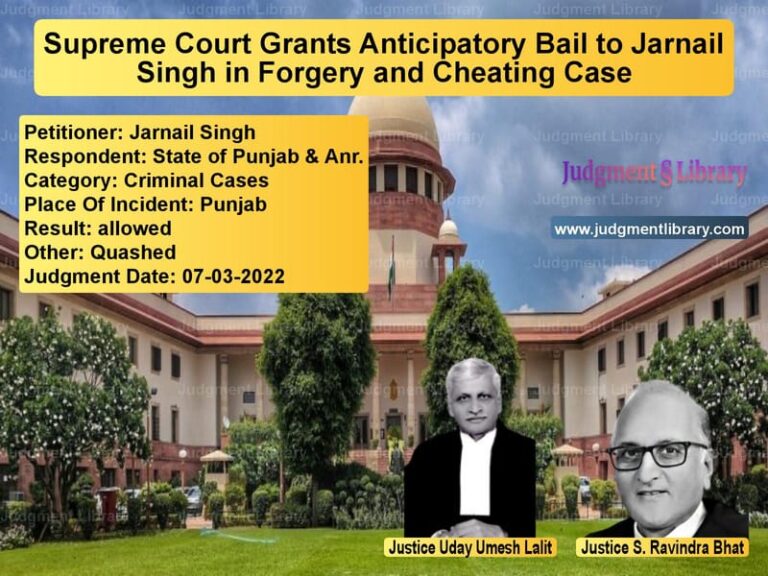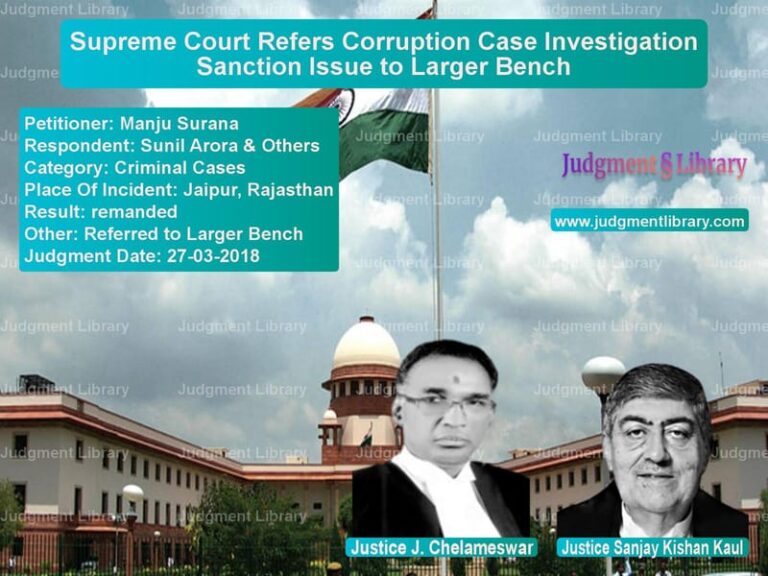Supreme Court Rules in Favor of Colorblind Candidates for FTII Courses
The case of Ashutosh Kumar vs. The Film and Television Institute of India (FTII) & Anr. is a landmark ruling addressing discrimination against colorblind candidates in educational institutions. The Supreme Court examined whether colorblind individuals could be denied admission to courses at FTII, particularly the Diploma in Film Editing program. The Court ultimately ruled in favor of inclusivity, recognizing the rights of individuals with color vision deficiency to pursue careers in filmmaking.
Background of the Case
The appellant, Ashutosh Kumar, applied for admission to the Diploma in Editing course at the Film and Television Institute of India (FTII), Pune. However, he was denied admission on the ground that he was colorblind. The FTII had an eligibility requirement barring colorblind candidates from enrolling in several of its courses, including:
- Cinematography
- Electronic Cinematography
- Editing
- Video Editing
- Art Direction and Production Design
Aggrieved by this rejection, the appellant challenged the decision, arguing that his condition did not hinder his ability to complete the course. The matter eventually reached the Supreme Court, where it raised fundamental questions about equal opportunity in education and professional training.
Read also: https://judgmentlibrary.com/supreme-court-orders-compensation-for-victims-of-meerut-fire-tragedy/
Formation of Expert Committee
Instead of making a unilateral decision, the Supreme Court constituted an Expert Committee to study the impact of colorblindness on film editing and other filmmaking disciplines. The Committee included:
- Ravi K Chandran – Film Director
- Swapnil Patole – Colorist
- Shubha Ramachandra – Script Supervisor
- Akkineni Sreekar Prasad – Film Editor
- Rajasekharan – HOD, Editing
- Dr. Jignesh Taswala – Ophthalmologist
- Shoeb Alam – Advocate
Key Findings of the Committee
The Committee studied international best practices, consulted film professionals, and evaluated the relevance of color perception in film editing. The key findings were:
1. Colorblindness Does Not Hinder Film Editing
The Committee noted that film editing is primarily about sequencing, pacing, and storytelling rather than color grading. A professional editor works collaboratively with a colorist who handles color adjustments.
2. Colorblindness and Other Creative Professions
The Committee cited numerous examples of successful individuals with disabilities excelling in their fields:
- Sir Roger Deakins – Oscar-winning cinematographer who relies on assistants for digital color correction.
- Loren Long – A renowned illustrator with colorblindness.
- Sudha Chandran – A dancer with a prosthetic limb.
- Pranav Lal – A blind photographer using sound-based imaging technology.
3. International Film Schools Do Not Discriminate
Leading film institutes worldwide do not bar colorblind candidates. Institutions like CalArts and other global film schools make reasonable accommodations instead of enforcing blanket bans.
4. FTII’s Existing Policy Lacked Specificity
The FTII’s admission policy did not distinguish between different types of colorblindness. The Expert Committee found that only severe cases (like complete monochromacy) might pose difficulties, but even those could be managed with assistance.
Read also: https://judgmentlibrary.com/supreme-court-upholds-eviction-decree-in-rajasthan-rent-control-case/
Supreme Court’s Verdict
The Supreme Court accepted the Committee’s recommendations and ruled that:
- FTII must allow colorblind candidates to enroll in all courses.
- The 20-minute “color grading module” in the editing course must be made optional or removed.
- Other film schools in India should follow this ruling.
The Court stated:
“Art is non-conformist in character. The restrictions imposed by FTII contradict the essence of filmmaking as a collaborative art form.”
The ruling emphasized that the FTII’s approach was outdated and did not align with modern filmmaking practices.
Impact of the Judgment
This judgment is a significant victory for inclusivity in creative education. By ensuring that individuals with colorblindness are not unfairly excluded, the Supreme Court has set a precedent for other academic institutions in India. The ruling recognizes that:
- Disabilities do not define a person’s creative potential.
- Educational institutions must adopt reasonable accommodations.
- Outdated admission policies should be reformed to reflect contemporary industry practices.
Conclusion
The Supreme Court’s decision in Ashutosh Kumar vs. FTII is a landmark ruling promoting equal opportunities in education and the arts. By ensuring that colorblind individuals are not excluded from film courses, the Court has reinforced the principles of inclusivity and non-discrimination.
The ruling serves as a wake-up call for institutions still following exclusionary policies. With this judgment, India takes a step forward in ensuring that education remains accessible to all, irrespective of physical limitations.
Petitioner Name: Ashutosh Kumar.Respondent Name: The Film and Television Institute of India & Anr..Judgment By: Justice Sanjay Kishan Kaul, Justice M.M. Sundresh.Place Of Incident: Pune, Maharashtra.Judgment Date: 12-04-2022.
Don’t miss out on the full details! Download the complete judgment in PDF format below and gain valuable insights instantly!
Download Judgment: ashutosh-kumar-vs-the-film-and-televis-supreme-court-of-india-judgment-dated-12-04-2022.pdf
Directly Download Judgment: Directly download this Judgment
See all petitions in Education Related Cases
See all petitions in Fundamental Rights
See all petitions in Public Interest Litigation
See all petitions in Judgment by Sanjay Kishan Kaul
See all petitions in Judgment by M.M. Sundresh
See all petitions in allowed
See all petitions in Quashed
See all petitions in supreme court of India judgments April 2022
See all petitions in 2022 judgments
See all posts in Civil Cases Category
See all allowed petitions in Civil Cases Category
See all Dismissed petitions in Civil Cases Category
See all partially allowed petitions in Civil Cases Category







